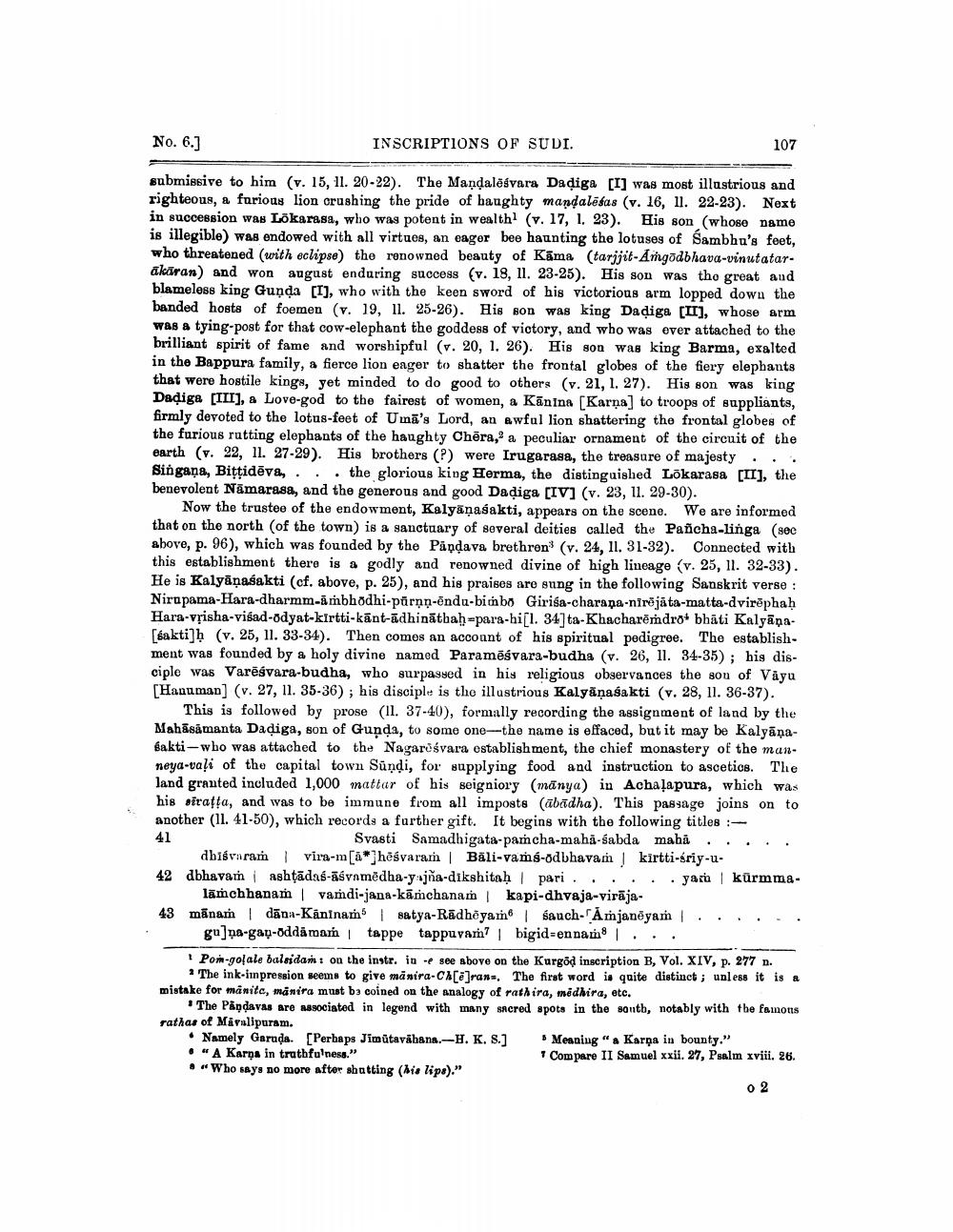________________
No. 6.]
INSCRIPTIONS OF SUDI.
107
submissive to him (v. 15, 11. 20-22). The Mandalēśvara Dadiga [I] was most illustrious and righteous, a furioas lion crushing the pride of baughty mandalēšas (v. 16, 11. 22-23). Next in succession was Lökarasa, who was potent in wealth (v. 17, 1. 23). His son (whose name is illegible) was endowed with all virtues, an eager bee haunting the lotuses of Sambhu's feet, who threatened (with eclipse) the renowned beauty of Kāma (tarijit-Angodbhava-vinutatarakaran) and won august enduring success (v. 18, II. 23-25). His son was the great and blameless king Guņda [I), who with the keen sword of his victorious arm lopped down the banded hosts of foemen (v. 19, 11. 25-26). His son was king Dadiga [II], whose arm was a tying-post for that cow-elephant the goddess of victory, and who was ever attached to the brilliant spirit of fame and worshipful (v. 20, 1. 26). His son was king Barma, exalted in the Bappura family, a fierce lion eager to shatter the frontal globes of the fiery elephants that were hostile kings, yet minded to do good to others (v. 21, 1. 27). His son was king Dadiga (11), a Love-god to the fairest of women, a Kānina [Karna] to troops of suppliants, firmly devoted to the lotus-feet of Uma's Lord, an awful lion shattering the frontal globes of the furious rutting elephants of the haughty Chēra, a peculiar ornament of the circuit of the earth (v. 22, 11. 27-29). His brothers (?) were Irugarasa, the treasure of majesty .. . Singaña, Biţtidēva, ... the glorious king Herma, the distinguished Lõkarasa [II], the benevolent Nämarasa, and the generous and good Dadiga [IV] (v. 23, 11. 29-30).
Now the trustee of the endowment, Kalyāṇasakti, appears on the scene. We are informed that on the north of the town) is a sanctuary of several deities called the Pancha-linga (see above, p. 96), which was founded by the Pandava brethren (v. 24, 11. 31-32). Connected with this establishment there is a godly and renowned divine of high lineage (v. 25, 11. 32-33). He is Kalyānasakti (cf. above, p. 25), and his praises are sung in the following Sanskrit verse : Nirupama-Hara-dharmm-ambhodhi-pārņn-ēndu-bimbo Girisa-charaṇa-nīrējäta-matta-dvirēphaḥ Hara-vrisha-visad-odyat-kirtti-kānt-adhinātbah-para-bi[l. 34]ta-Khacharēmdrobhāti Kalyāņa[sakti]h (v. 25, 11. 33-34). Then comes an account of his spiritual pedigree. The establishment was founded by a holy divine named Paramēśvara-budha (v. 26, II. 34-35); his disciple was Varēsvara-budha, who surpassed in his religious observances the son of Vayu [Hanuman] (v. 27, 11. 35-36); his disciple is the illustrious Kalyanasakti (v. 28, II. 36-37).
This is followed by prose (11. 37-40), formally recording the assignment of land by the Mahāsāmanta Dadiga, son of Gunda, to some one-the name is effaced, but it may be Kalyānabakti - who was attached to the Nagarośvara establishment, the chief monastery of the manneya-vali of the capital town Sündi, for supplying food and instruction to ascetics. The land granted included 1,000 mattar of his seigniory (mänya) in Achaļapura, which was his siratta, and was to be immune from all imposts (ābūdha). This passage joins on to another (11. 41-50), which records a further gift. It begins with the following titles : 41
Svasti Samadhigata-pancha-maha-sabda maha ..... dbiśvaram vira-m[a]heśvaram | Bāli-vams-odbhavam kirtti-sriy-u. 42 dbhavam i ashtādas-āśvamēdha-yajña-dikshitaḥ pari ...... yari kūrmma
lamchhanam vamdi-jana-kāmchanam kapi-dhvaja-virāja43 mānam dana-Kaninam | satya-Rādhëyam | fauch-Amjaneyam . .. .. .
gulna-gay-oddāmam tappe tappuvam? | bigid=ennam . . . 1 Pom-gofale balsidan : on the instr. in -e see above on the Kurgod inscription B, Vol. XIV, p. 277 n.
2 The ink-impression seems to give māsira-Ca[7]rans. The first word is quite distinct; unless it is a mistake for manite, manita must b3 coined on the analogy of rathira, midhira, etc.
* The Påņdavas are associated in legend with many sacred spots in the south, notably with the famous rathas of Märulipuram.
• Namely Garuda. [Perhaps Jimutavábana.-H. K, S.] Meaning ". Karna in bounty." . "A Karna in trathfulness."
Compare II Samuel xxii. 27, Psalm xviii. 26. . «Who says no more after shatting (mis lips)."
o 2




